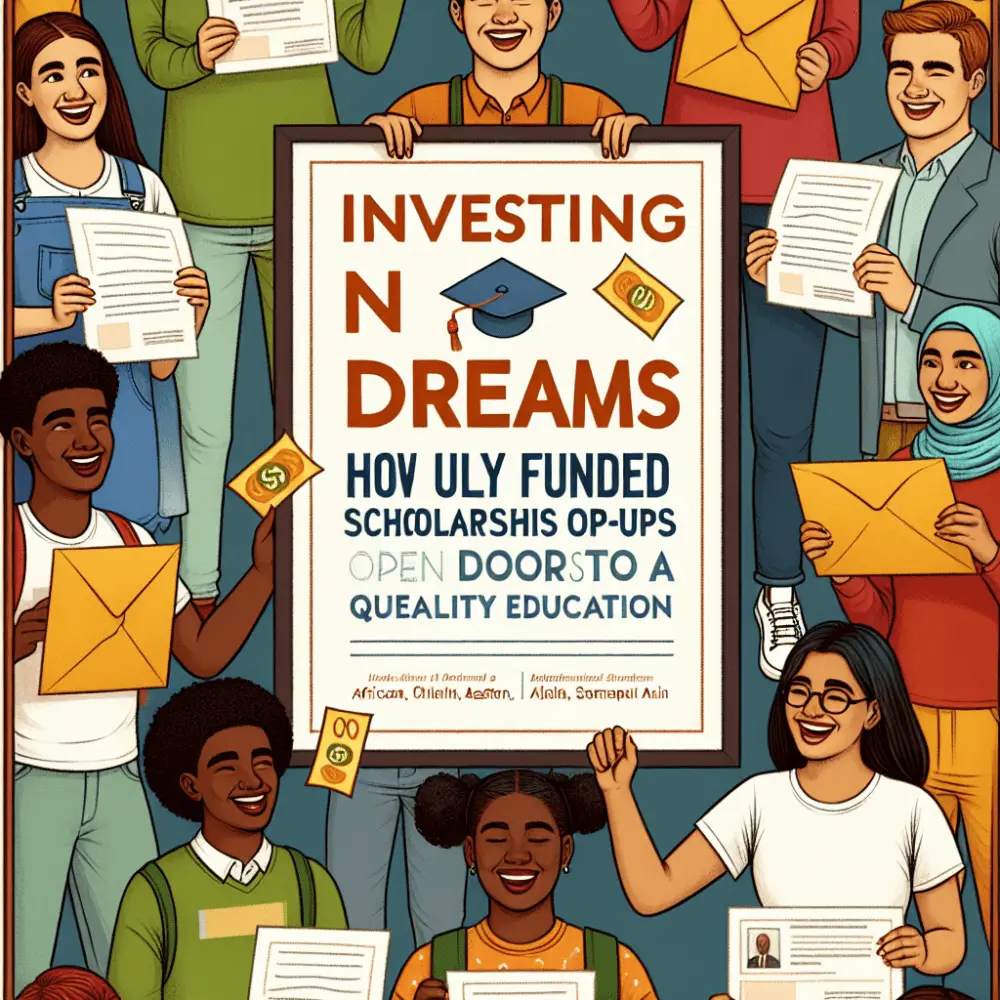
Title: How Fully Funded Scholarships Shape the Future of Higher Education
Fully funded scholarships significantly shape the future of higher education by making it accessible to talented students who might otherwise not afford it. They not only alleviate financial burdens but also encourage academic excellence, promote diversity, and foster global understanding.
What Stops You Right Now from Earning a $5000 Scholarship from a Good University?
Lack of awareness and preparation are major roadblocks. Many students are unaware of the various scholarships available or how to apply. For instance, the "2021 Gates Foundation Scholarship" is an incredible opportunity, but it requires a thorough understanding of the application process and eligibility criteria.
The Financial Impact
Fully funded scholarships cover tuition, fees, room, and board, and sometimes even travel costs. This alleviates the need for students to work part-time jobs, allowing them to focus on their studies. This financial relief can be a game-changer for students from middle and low-income families, making higher education attainable.
Encouraging Academic Excellence
Scholarships often set high academic standards for eligibility, encouraging students to perform their best in high school and even earlier. These scholarships often require maintaining a high GPA, which ensures that recipients remain committed to their studies once enrolled in college.
Promoting Diversity and Inclusion
Fully funded scholarships can also help diversify college campuses. Programs like the 2021 Gates Foundation Scholarship specifically target underrepresented minorities, opening doors to students from diverse backgrounds. This diversity enriches the educational experience for all students, fostering a more inclusive and understanding community.
Global Opportunities
Some fully funded scholarships, such as the Fulbright Program, focus on enabling students to study abroad. This opportunity enhances cultural exchange and broadens the student’s worldview, which is essential in today’s globalized society. These experiences are invaluable, offering exposure to diverse perspectives and educational systems.
Reducing Student Debt
In the United States, where student debt is a growing concern, fully funded scholarships play a crucial role. Graduates often start their careers burdened by enormous debt, affecting their financial stability and life choices. Scholarships reduce this debt, allowing students to begin their professional lives with a clean slate, pursuing careers aligned with their passions rather than those dictated by financial necessity.
Creating Opportunities for First-Generation Students
Many fully funded scholarships aim to support first-generation college students. These students often face unique challenges, including lack of familial knowledge about the college application process and financial constraints. Scholarships can provide these students not only with financial support but also with mentorship and guidance, helping them navigate the complexities of higher education.
Scholarships and Research
For graduate students, fully funded scholarships can also support research opportunities. Programs like the National Science Foundation’s Graduate Research Fellowship provide funds for students to conduct their research, contribute to their field, and gain valuable experience. This funding is crucial for advancements in various disciplines, from medicine to engineering.
The Role of Philanthropy
Philanthropic organizations play a significant role in providing scholarships. The Gates Foundation, for example, offers substantial scholarships with the aim of improving lives through education. These organizations recognize the long-term benefits of investing in human potential, and their support can create ripple effects in communities across the globe.
Building a Skilled Workforce
In the broader context, fully funded scholarships contribute to building a skilled, educated workforce. By providing access to higher education, these scholarships help create professionals who are well-prepared to contribute to their fields. This workforce is better equipped to tackle the challenges of the modern world, driving innovation and economic growth.
Encouraging Community Engagement
Many scholarships require recipients to engage in community service or outreach activities. This encourages students to give back to their communities and develop a sense of social responsibility. Such requirements help create well-rounded individuals who are not only academically proficient but also socially committed.
Expanding the Applicant Pool
By offering fully funded scholarships, universities can attract a broader range of applicants. This increased competition can raise the academic standards of the institution, encouraging continuous improvement in educational quality. Moreover, diverse and talented student bodies can enhance the reputation and prestige of these universities.
Challenges and Future Directions
While fully funded scholarships offer numerous benefits, they are not without challenges. The application processes can be complex and highly competitive. Additionally, not all institutions have the resources to provide such scholarships. Moving forward, increasing the availability and accessibility of these scholarships will be critical.
Educational institutions, governments, and private organizations must work together to expand funding opportunities and streamline application processes. Ensuring that all eligible students are aware of and can access these resources is key to realizing the full potential of fully funded scholarships.
Conclusion
In conclusion, fully funded scholarships are transformative tools in higher education. They provide financial relief, promote academic excellence, foster diversity, enable global opportunities, and reduce student debt. Moreover, they support first-generation students, drive research, and help build a skilled workforce. As the higher education landscape continues to evolve, the role of fully funded scholarships becomes increasingly crucial. They are not just financial aid; they are investments in the future of individuals and society. Institutions and philanthropic organizations must continue to support and expand these programs to ensure that every talented student has the opportunity to achieve their highest educational ambitions.
















